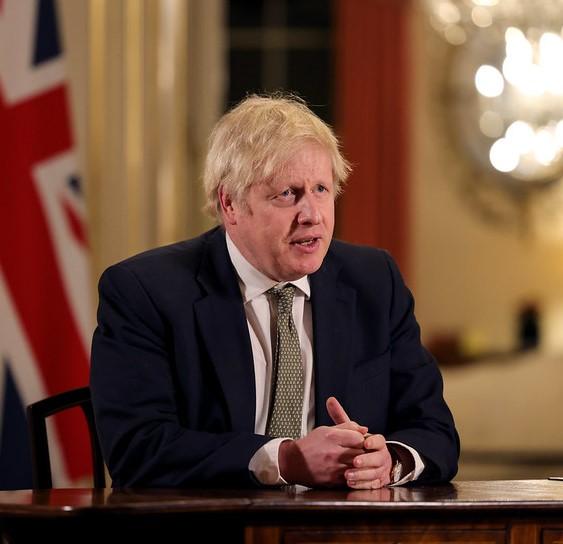Amid a third surge of COVID-19 in Europe, likely fueled by holiday gatherings and made worse by a more transmissible UK coronavirus variant (B117), Britain's Prime Minister Boris Johnson today announced a new lockdown, following recent announcements by Ireland and Scotland.
Cases in the region continued to soar, with Britain today reporting a new record daily high of 58,784 new cases, according to Public Health England, and Ireland reporting a single-day high of 6,110 cases.
UK locks down
The new UK lockdown, the country's third, is in effect until at least the middle of February, according to the BBC. Johnson warned the weeks ahead will be the country's hardest, as the more transmissible variant of the virus spreads across the country.
The new measures close most schools and keep people at home, except for essential tasks such as food shopping, medical care, work, and exercise. The House of Commons is expected to vote on the new measures on Jan 6, but Johnson urged citizens to start following the rules immediately, due to the surge in cases and pressure on the health system.
On Dec 30, Ireland's Prime Minister Michael Martin announced that the country would move to its highest restriction level until at least the end of January, according to RTE. He warned that the virus activity is growing exponentially and that the situation is likely to deteriorate over the coming days.
Similarly, Scotland today announced a new lockdown, its strictest since the first surge, in an effort to curb the rapidly spreading variant, which First Minister Nicola Sturgeon said now makes up nearly half of the country's cases, according to Reuters.
The UK's top health officials today recommended that the UK's alert level move from level 4 to level 5, the highest level, signifying that many health systems are already under pressure and that cases are rising almost everywhere, much of it driven by the new, more transmissible variant. "We are not confident that the NHS can handle a further sustained rise in cases and without further action there is a material risk of the NHS in several areas being overwhelmed over the next 21 days," the government said in a joint statement.
Over the holiday weekend, Royal London Hospital announced in an e-mail to staff that it was in disaster medicine mode and is unable to provide high-standard critical care, according to media reports, which showed lines of ambulances waiting with patients outside the facility.
The lockdown comes amid new vaccine developments, which include the rollout today of the first AstraZeneca-Oxford doses and people beginning to receive their second doses of the Pfizer-BioNTech vaccine. Like other countries, the UK is struggling to get vaccine out as soon as possible as it battles the rapidly rising surge and navigatescomplex issues around ways to maximize its vaccine supply.
Over the holiday weekend, UK health officials said it will allow the mixing of COVID-19 vaccines in rare instances, according to Reuters. Last week, health officials urged health workers to delay the second dose of the two emergency use vaccines, deviating from second-dose timing used in phase 3 clinical trials.
B117 variant in more than 30 countries
In a Dec 31 statement, the World Health Organization (WHO) reviewed all the SARS-CoV-2 variants that have been reported since the start of the pandemic, noting that the B117 variant first appeared in South East England, and within a few weeks replaced the lineage there and in London, and has now been found across the UK. As of Dec 30, it has been detected in 31 countries and five of the WHO's six regions. Today, CNN reported that B117 has now been found in 37 countries.
It also said that a similar but distinct variant first detected in South Africa (501Y.V2) in the middle of December, based on preliminary findings, is associated with a higher viral load, which could increase its transmissibility. So far there are no clear links to more severe disease or worse outcomes. The WHO said as of Dec 30, 501Y.V2 has been reported from four other countries
In other global headlines:
- The WHO on Dec 31 announced that it issued its first emergency use for a COVID-19 vaccine, which applies to the one from Pfizer-BioNTech. The WHO's review and action speeds the ability of countries to import and use the vaccine and paves the way for UNICEF and the Pan American Health Organization to buy it for countries in need.
- In other vaccine developments, the European Medicines Agency is reviewing Moderna's vaccine and is expected to approve emergency use any day now, Reuters reported, and India has approved the locally developed Covaxin vaccine, an inactivated adjuvanted product made by Bharat Biotech, according to Reuters. So far, no phase 3 findings have been reported, and the approval marks the country's second behind the AstraZeneca-Oxford vaccine.
- Thailand today reported a new single-day high case number, according to Reuters, and country leaders are urging people to stay home to avoid tough lockdown measures. Elsewhere, Lebanon today ordered a new lockdown amid a holiday surge in infections, according to the Associated Press, which said the measure goes into effect Jan 7 and will last 25 days.
- Over the weekend, the global total topped 85 million cases and is now at 85,510,573 cases with 1,849,206 deaths, according to the Johns Hopkins online dashboard.





















